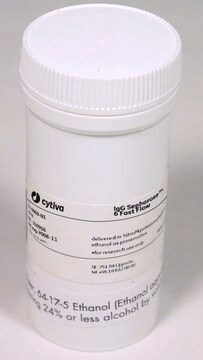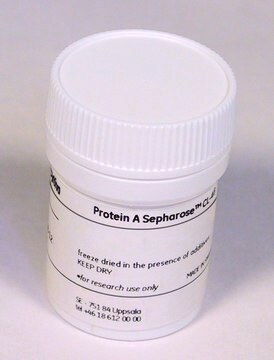A6284
Human IgG−Agarose
suspension
Synonyme(s) :
IgG Agarose
Se connecterpour consulter vos tarifs contractuels et ceux de votre entreprise/organisme
About This Item
Produits recommandés
Conjugué
agarose conjugate
Niveau de qualité
Forme
suspension
Ampleur du marquage
≥5 mg per mL
Matrice
Cross-linked 4% beaded agarose
Activation de la matrice
cyanogen bromide
Espaceur de matrice
1 atom
Température de stockage
2-8°C
Description générale
Human IgGs are glycoprotein antibodies that contain two equivalent light chains and a pair of identical heavy chains. IgGs have four distinct isoforms, ranging from IgG1 to IgG4. These antibodies regulate immunological responses to allergy and pathogenic infections. IgGs have also been implicated in complement fixation and autoimmune disorders.
Application
IgG-Agarose is an immuno-adsorbent that can be used to affinity purify antibodies, remove species-specific cross-reacting antibodies or remove contaminating antibodies from an antiserum preparation. Typically, cross-reacting antibodies may be removed from an antiserum preparation using an equal volume of IgG-Agarose (resin volume). However, the resin to antiserum ratio will vary with individual applications.
Tandem affnitiy purification pulldown was performed in yeast cultures using agarose-linked human IgG. Supernatants were mixed with 30μl of agarose beads overnight.
Forme physique
Suspension in 0.5 M NaCl containing preservative.
Clause de non-responsabilité
Unless otherwise stated in our catalog or other company documentation accompanying the product(s), our products are intended for research use only and are not to be used for any other purpose, which includes but is not limited to, unauthorized commercial uses, in vitro diagnostic uses, ex vivo or in vivo therapeutic uses or any type of consumption or application to humans or animals.
Code de la classe de stockage
10 - Combustible liquids
Classe de danger pour l'eau (WGK)
WGK 3
Point d'éclair (°F)
Not applicable
Point d'éclair (°C)
Not applicable
Faites votre choix parmi les versions les plus récentes :
Déjà en possession de ce produit ?
Retrouvez la documentation relative aux produits que vous avez récemment achetés dans la Bibliothèque de documents.
Graciela C Calabrese et al.
Thrombosis research, 105(6), 537-541 (2002-07-02)
Antithrombin (AT) high affinity of unfractionated heparin (UFH) resides in a specific pentasaccharide sequence. Heparin also regulates complement activity on the classical and the alternative pathways. Most experimental pieces of evidence accumulated show that these important activities reside in different
Pierre Fotso et al.
The Journal of biological chemistry, 280(30), 27613-27623 (2005-06-04)
The conserved oligomeric Golgi (COG) complex is an evolutionarily conserved peripheral membrane oligomeric protein complex that is involved in intra-Golgi protein trafficking. The COG complex is composed of eight subunits that are located in two lobes; Lobe A contains COG1-4
Graciela C Calabrese et al.
Thrombosis research, 113(3-4), 243-250 (2004-05-14)
Dermatan sulfate (DS) is a member of the family of structurally complex, sulfated, linear heteropolysaccharides called glycosaminoglycans (GAGs). It has a similar structure to heparin and heparan sulfate (HS), but with acetylgalactosamine replacing glucosamine, and the uronic acid moiety, mainly
A G Norden et al.
Clinical chemistry, 43(6 Pt 1), 957-962 (1997-06-01)
A novel interference with measurements of serum free thyroxine (FT4) caused by rheumatoid factor (RhF) is described. We found misleading, sometimes gross, increases of FT4 results in 5 clinically euthyroid elderly female patients with high RhF concentrations. All 5 patients
Yeon Jeong Kim et al.
Frontiers in plant science, 10, 667-667 (2019-06-14)
Control of protein turnover is a key post-translational control point in the oscillatory network of the circadian clock. Some elements, such as TOC1 and PRR5 are engaged by a well-described F-box protein, ZEITLUPE, dedicated to their proteolytic turnover to shape
Notre équipe de scientifiques dispose d'une expérience dans tous les secteurs de la recherche, notamment en sciences de la vie, science des matériaux, synthèse chimique, chromatographie, analyse et dans de nombreux autres domaines..
Contacter notre Service technique








